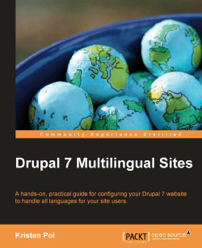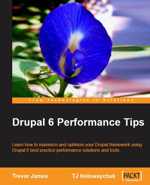I've highlighted some great developments around multilingual Drupal in my Denver core conversation talk (see the slides and video for details on where Drupal 8 multilingual improvements are going or check out the interview with me on Modules Unraveled from last week). First of all, there are some great new developments with each, second these got little publicity if anything, so I wanted to broadcast the good news here too.
Drupal 7 Multilingual Sites book is out
The Drupal 7 Multilingual Sites book is out from Packt Publishing! Jose Reyero (Internationalization module maintainer) was a technical reviewer, and I've been involved with the book as a technical reviewer in parallel (without monetary compensation), so even if you might not recognize the name of the author (Kristen Pol), I can assure you that it is a strong book. It starts off from the basics and reaches as far as it comprehensively can in the small size. It goes through some complex topics like tips and tricks for Views, Panels and SEO, and even includes comprehensive tables for which module to use for translating what. Some topics were cut out due to the size boundaries but you can already read one of those as an article on Kristen's blog on Drupal Commerce localization. The book should be a life-saver for anybody starting out building multilingual Drupal 7 sites and even those who already got started but stumbled into some seemingly unsolvable issues. Admittedly as the book goes into some of the more advanced topics, you'll face note boxes more and more as it references issues where fixes for problems are in the works. Help is always welcome.
Ps. Kristen is happy to donate ruffle copies of the book for your events, see https://twitter.com/#!/kristen_pol/status/193752939515490304
New Translation Management Tool module
While there are relatively good tools to translate content, configuration and the user interface in Drupal, larger scale setups will require more complex translation workflows with queues for people working on translations and integration with outside services and subcontractors for translation. Remember the Translation Management module? Well, that was a bit monolithic solution to this problem, did not integrate with common Drupal components such as Views and Rules and was never fully ported to Drupal 7. There was no community behind it and as the developers stopped working on it, there was no solution for people to look to.
Enter Translation Management Tool (tmgmt) a solution along the Drupal way (TM) to the same problems. It is component based, already integrates with more services and is backed by several companies in Europe. It was bootstrapped earlier this year in Europe and is actively developed ever since. For further icing on the cake, a great project to improve and build on the module was accepted for this year's Google Summer of Code, so we are going to see even more awesomeness coming from there!
Drupal as base implementation in European Union multilingual project
Carsten and Carina from Cocomore held a discussion at Drupalcon Denver incorporating their announcement of the EU funded "MultilingualWeb - Language Technologies" (MultilingualWeb-LT) project for the Drupal community. The project is managed by a W3C Working Group and its goal is "to combine several existing technologies and standards to close gaps in the technical localization chain by better integrating localization service providers and translation technologies". It is not just a standards effort, the initial implementation is going to happen based on Drupal! Yes! We hope to work with this project on Drupal 8 improvements if the timeline allows and they certainly plan to make heavy use of the tmgmt module on Drupal 7 which should lead to more improvements and fixes there.


